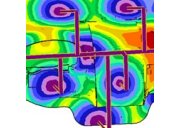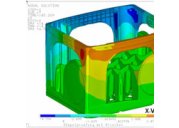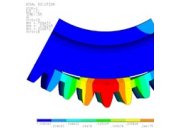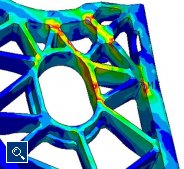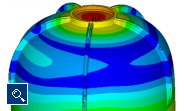Component dimensioning
Components that are designed with suitable levels of resistance for secure investments
Plastics are complex materials which is particularly evident in terms of their mechanical behaviour under load. The stress-strain behaviour of this material shows distinctive dependencies of the expansion, expansion speed, temperature, dampness as well as the type of stress it is exposed to. The cause of this behaviour is the creep tendency or relaxation of plastics (reduction of stress due to the reorientation of molecules).
Finite-element stress simulations
Only those will achieve realistic calculation results of the material behaviour of plastic components who select the right material models besides the meshing of the geometry and the setting of the constraints. Being aware of the model used, the material coefficients and also the dimensioning criteria applied in relation to the load condition is decisive in terms of the validity of the results.
3D fibre orientation calculation improves prediction of lifetime
In the course of the dimensioning calculation the product developer would also like to predict lifetime of a component based on the assumption of certain environmental influences such as the temperature and the media attack. This especially applies to complex, fibre-reinforced components. Contrary to metals there is no established scientific procedure for plastics. However, all the different approaches have a FEM analysis in common, which calculates the stress-strain distribution in the component based on the loads and the material coefficients input calculated prior to this. Moldex as a 3D filling simulation programme and a very efficient tool provides a strength matrix for a precise calculation with the FE system ANSYS. The strength distribution calculated is either directly mapped onto a FEM mesh or if the computer is powerful enough the mesh generated is directly used in the FEM calculation for the filling simulation.
Plastics simulation centre
We perform calculations of the mechanical structure involving the following tasks:
- Linear and non-linear as well as anisotropic problems
- Components with contact
- Various component variants with respect to the optimisation goals agreed upon
- Compression stresses
- Vibration analysis
- Impact loads
- Fibre composite parts
- Lifetime prediction
Computing software used
Impetus Plastics Engineer uses the ANSYS FEM system to calculate component stresses.
As a specialist for the simulation of the injection moulding process and of component stresses Impetus Plastics Engineering has already clearly demonstrated its expertise in hundreds of projects. The calculation of component variants, FEM simulations of loaded states, deformation situations and failure modes, structural analysis of glass fibre reinforced injection moulded pieces as well as anisotropy tests thus form part of the service portfolio.
